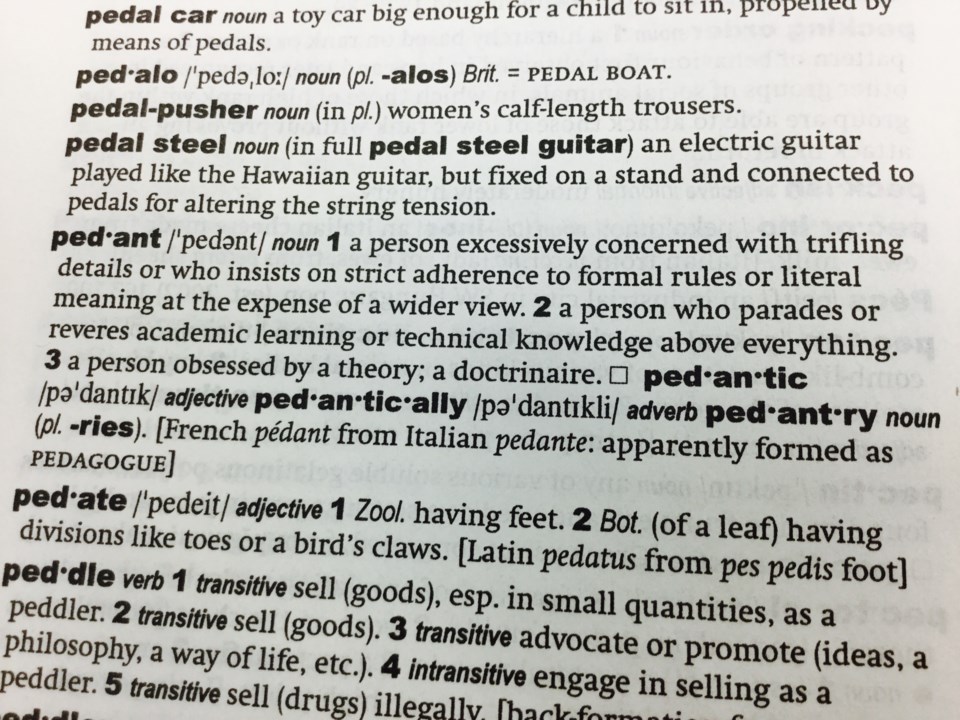 The BBC thinks I should put down my pitchfork. Or, to be precise, a BBC.com opinion piece has — as a surprising number of TC readers alerted me gleefully — branded me a language zealot.
The BBC thinks I should put down my pitchfork. Or, to be precise, a BBC.com opinion piece has — as a surprising number of TC readers alerted me gleefully — branded me a language zealot.
The column, posted on the British news site this month, was about people who are a tad too eager to impale those who break the often arbitrary rules of English usage. I was herded into a pack of such pedants.
“Those who take up these weapons often use them viciously,” wrote the piece’s author, James Harbeck. “In his recent book Bad English, the language scholar Ammon Shea has collected some striking examples. One George Quinn, in a 2004 letter to the Providence Journal newspaper, said that a particular writer who started a sentence with a conjunction should have been ‘appropriately beaten in grammar class.’ The poet Phyllis McGinley said the sentence adverb ‘hopefully’ ‘is an abomination and its adherents should be lynched.’ Jack Knox, a columnist for the Prince George Citizen, advocated capital punishment for anyone who used ‘gift’ as a verb.”
Prince George Citizen? OK, technically true in that the newspaper did reprint the column in question, but still a bit off base, like describing Hitler as a corporal in the Bavarian army.
As for the assertion itself: Guilty as charged. The line came from a 2005 column in which I urged the death penalty for anyone who A) wears a Speedo that he can’t see for his gut, B) tosses cigarette butts out the car window, C) signals a left turn only after stopping at the intersection, D) TALKS! LIKE! THIS! on a mobile phone in a restaurant or, yes, E) uses the words impact, transition, medal, parent or gift as a verb.
More to the point — and conveniently ignoring my use of “transition” as a verb in Friday’s column — I remain defiant. The verb “gift” (as in “I had an extra kidney, so gifted her one”) impacts me negatively. It’s an affectation, like making a show of carrying your yoga mat or pretending to like quinoa. Hang ’em high, I say.
Never mind that I am, technically speaking, flat-out wrong. As Shea argues in his 2014 book, gift has been used as a verb for more than 400 years. Such usage fell out of favour, but was made popular again recently (kind of like Johnny Cash before he died).
Also, never mind that me moaning about improper use of English is more than a little pot-kettleish, given the frequency with which more-qualified language cops bust me for driving without due care and attention. (“Shame on you!” chided one reader after I identified the two dots in Michaëlle Jean’s name as an umlaut instead of a diaeresis.)
But hey, if Sean Spicer can say the White House had “strucken the right balance,” as he did last week, and Donald Trump can tweet “I am honered to serve you” as he did on his first full day as president, then I can self-righteously point an accusing finger at those who butcher the English language, even while holding a meat cleaver in my other hand. The bar is no longer that high.
The evidence is everywhere. Texting has reduced us to digital grunting (“Where r u” or, worse, “Wear r u”), while responsibility for proper spelling has been handed off to that drunken babysitter autocorrect. The gymnastics involved in avoiding the use of gender (“the driver who hit me took off without leaving their name”) can result in awkward sprains, if not broken syntax.
Punctuation is a problem. We either forget to use apostrophes (mens room, indeed) or scatter them at random, as though playing pin the tail on the donkey. Ditto for commas. (To repeat: Had I known the difference between “you never call me” and “you, never call me,” I could have avoided a nasty restraining order.) Our “use” of “quotes” is more “arbitrary” than logical.
Words are wielded imprecisely. Pet peeve: the interchangeable use of “suspect” and “bad guy” in crime stories, even though the whole reason for using the former is to make a distinction between the criminal who is known to have committed the crime and the person who is — wait for it — suspected of being the criminal. Saturday morning, when the TV news reported that pig-mask-wearing “suspects” fled through the garage after robbing Las Vegas’s Bellagio, I repeated this point to my television screen at length until it was suggested the news anchor might hear me if I shouted louder. This might have been sarcasm.
It also brings us back to the whole point of the BBC article, which is that having language puritans running around in tall black hats with big buckles, burning heretics at the stake, is counterproductive. Caring about language usage is fine, but heaping abuse on those who err or deviate from the norm is — and here I paraphrase — buttheadish.
Guilty, your honer.



